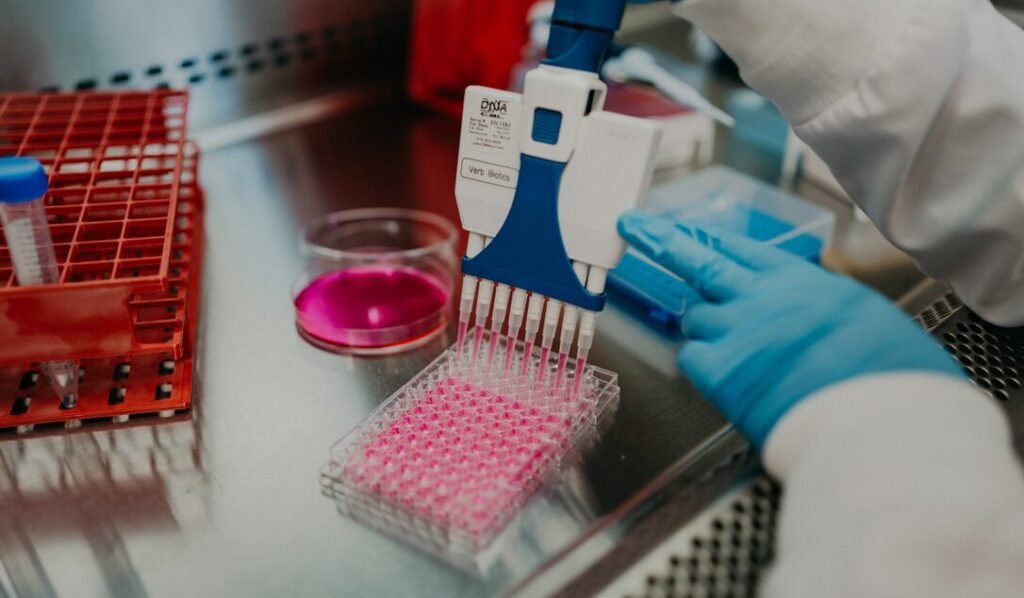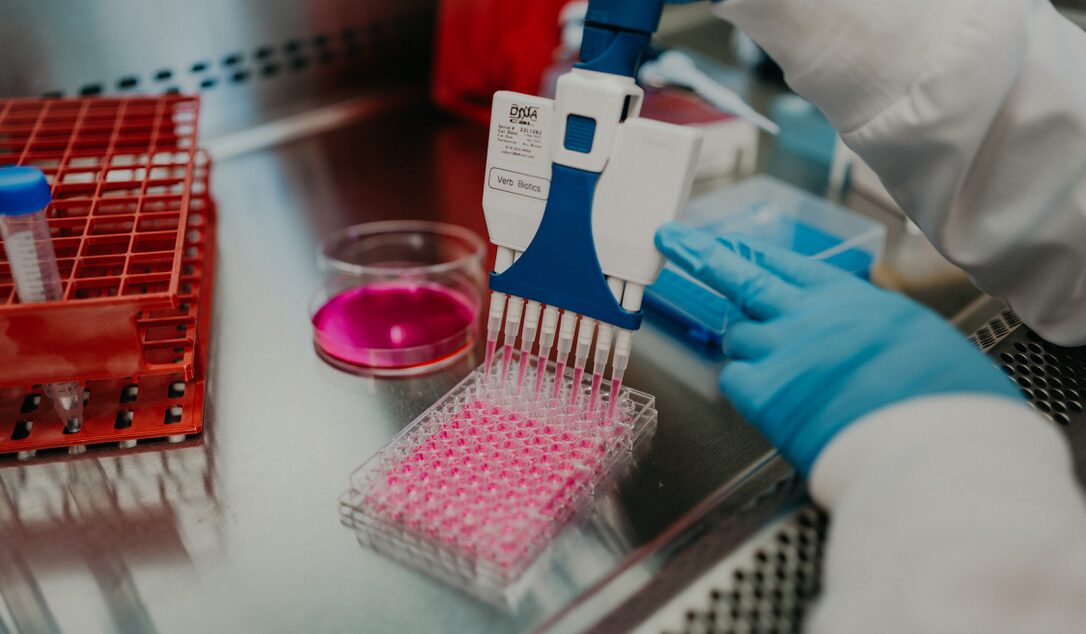
Many companies in the probiotics space start with a flagship strain and then study it to determine potential health benefits. Microbiome health startup Verb Biotics flips that on its head, claims CEO Todd Beckman.
“We’re function-first, and we’re not tied into any one organism or flagship strain,” says Beckman, who spent 13 years building consumer probiotics brand Goodbelly before becoming a strategic advisor to synthetic biology company Ginkgo Bioworks.
“Our model is more like a pharma model, where we start with a health indication, try to understand a mechanism of action to implicate that health condition, and then develop biotic solutions to achieve that health outcome.”
Spun out of Ginkgo in 2021 with $30 million from Viking Global Investors and Cascade Investment, Verb Biotics creates “precision biotics” for foods and supplements with “measurable effects that consumers can feel.”
Its first two ingredients launched last year and are building traction as partners incorporate them into foods, beverages, and supplements, says Beckman, who says Verb Biotics screens millions of microbial strains to find candidates that naturally produce beneficial metabolites. It is also developing synthetic biology approaches to write metabolic pathways into microbes to produce said metabolites.
Postbiotics for gut barrier integrity
Verb Biotics’ first product (Keystone Postbiotic) is a shelf-stable postbiotic comprising heat de-activated probiotics. One strain stimulates the growth of keystone bacteria (which play a crucial role in maintaining a healthy gut microbiome) and the other preserves gut barrier integrity (a “leaky gut” can cause inflammation, poor nutrient absorption, bloating, gas, diarrhea, and constipation).
Unlike probiotics, which are “live” microbes that can only be used in a limited number of food and beverage applications, postbiotics are inert, and can therefore be used in a wider variety of products that don’t need refrigeration or special processing conditions to maintain their viability, said Beckman.
“We take these two probiotic strains and ferment them on oats, and then heat treat them to deactivate them so they can be used in everything from gummies to functional beverages. Digestive health is really important to consumers, but most probiotics are very difficult to incorporate in applications such as beverages and baked items. The vision behind Keystone was make a digestive health product that can go into anything.”
Keystone is also efficacious at low doses and doesn’t negatively impact the organoleptic qualities of products to which it is added, he said.
“You see companies adding prebiotic fibers to beverages, for example, but they are typically in large doses, in grams, and can cause digestive issues, whereas the dose for Keystone Postbiotic is 300mg, and it actually reduces gas and bloating. We have early adopters in beverages and gummies, and we have several very large projects in the pipeline.”
Keystone Postbiotic is backed by pre-clinical data that demonstrates its epithelial and immune health properties coupled with a small pilot human trial showing reductions in gas and bloating. A larger human trial is ongoing, with data expected by the end of July, said Beckman.
Probiotics for mood, stress, sleep – for humans and pets
Verb Biotics’ second product (GABA Probiotic LP815) is a Lactiplantibacillus strain that produces GABA (Gamma-Aminobutyric Acid), a neurotransmitter that regulates mood, stress, and sleep.
“We started screening a bunch of different species, and we found a handful that naturally produce a decent amount of GABA,” explained Beckman. “Then we took them through a directed evolution program and through iteration after iteration, we were able to select a strain that produced about 3x the baseline, or about 100 milligrams of GABA per 1 billion CFU (colony forming unit).
“With LP815 you get a sustained release of GABA, whereas with most GABA supplements on the market, you get a surge of GABA but it has a very short half-life.”
He added: “We know from some of the other work we’ve done that the organism we’re using also sends signals to other microbes in the gut that have the ability to make GABA.”
LP815 is a robust strain that has been shown to survive the harsh conditions of the stomach and produce GABA in the gut, with tests showing GABA in fecal matter weeks after consumption, he claimed.
As for efficacy, he said, “We ran a human clinical trial focused on stress and mood and the data came back very strong, especially around irritability. We also conducted a well-powered sleep trial, which we hope will be published soon, where objective data [from Oura rings] and subjective data [from questionnaires] came back extremely well.”
A separate trial on dogs featuring objective data from bark collars and subjective data from questionnaires filled in by dog owners also yielded encouraging results on anxiety, aggression, and sleep, he said, with results about to be submitted to a peer-reviewed publication.
“The concern with dogs is about separation anxiety, aggression, and just general anxiety, and I think LP815 is uniquely positioned, because there really isn’t anything out there that’s addressing stress and mood in companion animals with a GABA approach.”

Designer biotics
While its first two products are Non-GMO, Verb Biotics is also working on genetically modified biotics, said Beckman.
“We recently did a couple of consumer surveys and found that consumers are more interested in efficacy and safety than whether something is GM or not, so we think there’s interest there. We also have a lot of discussions with large CPG companies. When we first started the company, there was a bit of hesitation around GM. Now we’re actually having some of them say, ‘Is that something you could do GM?’ so there seems to be more interest and more openness now.”
As for funding, he said, “We still have a significant amount of dry powder, so while we may consider a funding round to accelerate the pipeline or distribution, in terms of operating capital, we’re still in a really good spot.”
Stepping back, he said, Verb Biotics is still just scratching the surface of what’s possible. “We’re focused on developing technologies around gut and brain health, sleep, stress and mood, healthy aging, sports recovery, joint health, muscle maintenance, and women’s health, specifically around the menopause.”
WHAT ARE PROBIOTICS? According to the World Health Organization, probiotics are “live microorganisms that, when administered in adequate amounts, confer a health benefit on the host.” The benefits of these ‘good bacteria’ are strain-specific.
WHAT ARE PREBIOTICS? According to the International Scientific Association for Probiotics and Prebiotics (ISAPP), a prebiotic is: “a substrate that is selectively utilized by host microorganisms conferring a health benefit.” Prebiotics are fermented in the large intestine, serving as ‘food’ for beneficial microbes that already live in your body, and produce beneficial compounds such as short chain fatty acids.
WHAT ARE SYNBIOTICS? A mix of prebiotics and probiotics beneficial to the host (read the ISAPP definition here).
WHAT ARE POSTBIOTICS? A consensus statement from ISAPP defines postbiotics as “a preparation of inanimate microorganisms and/or their components that confer health benefits on the host.” Examples include EpiCor, a heat- and pH-stable yeast fermentate from Cargill made with a proprietary strain of baker’s yeast; and ADM’s HT-BPL1, a heat-treated version of its BPL1 probiotic that can be used in a wide range of food and beverage applications.
Further reading:
BiomEdit CEO: Next gen designer probiotics will disrupt the animal and human health market
The post Verb Biotics on next gen biotics: ‘We’re function-first, and we’re not tied into any one organism or flagship strain’ appeared first on AgFunderNews.



